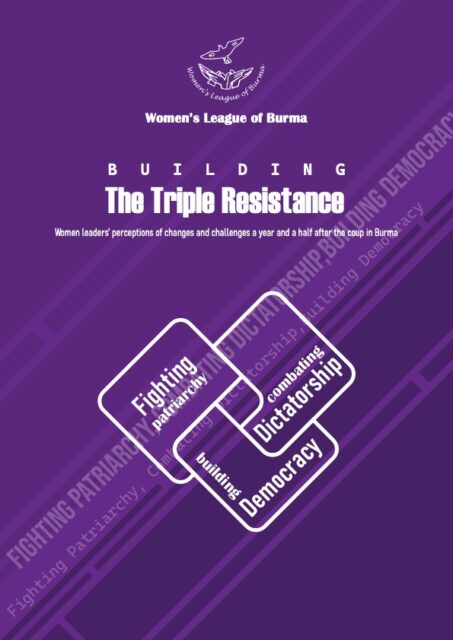Building The Triple Resistance

Building the ‘Triple Resistance’
Women leaders’ perceptions of changes and challenges a year and a half after the coup in Burma

-
Introduction
For decades women from Burma have been active participants in struggles for democracy, federalism, and ethnic self-determination. They have taken to the streets to protest, launched campaigns, and joined their male counterparts in the jungle to support the fight against the Myanmar military. Growing out of this resistance women’s organizations played a critical role in supporting women to access education, health services, and livelihood opportunities. Many have operated for decades in conflict-affected areas, dealing with oppression and violence perpetrat- ed by the military.
Generating more women leaders by providing capacity building has also been a crucial part of the work. Established in December 1999, the Women’s League of Burma (WLB) is a multi-ethnic network of women’s organizations aimed at increasing women’s representation in leadership, and decision and policy-making roles, including in the struggle for democracy and human rights, the national peace and reconciliation processes, and in politics. Set up in 2006, WLB’s Political Empowerment Program (PEP) (now integrated with other programs in the Leadership for Change Department) has focused on strengthening women ́s participation in the public arena, preparing women to become future leaders at local, regional, and national levels. PEP’s range of initiatives, including the Emerging Women Leadership School, feminist leadership and negotiation training, and internships, have helped budding ethnic women leaders to build practical skills and attain decision-making positions in civil society, ethnic resistance organizations, and political organizations.
Although there were still many challenges [Matelski and Noan, 2022], there were signs by late 2020 that initiatives to promote women’s leader- ship were beginning to bear fruit. In November elections, women’s representation among elected parliamentarians at all levels of govern- ment increased to 17%, up 12 percentage points since 2012. [Onello, 2021]. WLB’s Voices of Female Candidates of the 2020 General Elections report [2020], found that 907 women had participated in the elections despite facing structural and political constraints. Women’s organizations were eager to implement recommendations from the report including advocat- ing for electoral reform and working more closely with political parties. Previously ranked in the bottom 15%, Burma managed to move up to 118th place in the global Gender Inequality index by 2019. [Onello, 2021].
The 1 February 2021 military coup was a crushing blow, bringing fresh challenges and changes to women leaders, impacting their daily lives, their work, and how they advocate for their rights. Women have been the target of killings, torture and violations committed during military attacks. [WLB Monthly Situation Reports, 2021 – 2023] Women across Burma are also experiencing financial hardships and difficulties in accessing health services as systems fail. [UNDP and UN Women, 2022]
Yet these fresh challenges have not dimmed women’s strength and resilience. In the weeks and months after the coup media articles appeared highlighting the prominent and creative roles of women in the resistance. [Khan, 2021; Khin Khin Mra, 2021; Quadrini, 2021; BWU, 2022; Ebbighausen, 2022.] Special attention was given to the role of women in urban protests and in leading humanitarian response.
This report takes a deeper look at the situation of women leaders 18 months after the coup, particularly ethnic women leaders working in areas most affected by conflict. Engaging with alumni of the PEP’s Emerg- ing Women Leadership School and women leaders, it provides insight into the impact of the coup on women ́s participation. What kind of new (or ongoing) challenges do they face? Are their organizations still able to operate as before? Are ethnic women taking on new responsibilities? How has their work on women’s issues been transformed (or not?) As they approached the second-year anniversary of the coup, what were the main priorities for ethnic women and women’s organizations working in rural, conflict-affected areas?
This brief shines the light on ethnic women and women working in rural areas of Burma, providing a snapshot of perceptions of what has changed while embarking on what one woman termed the ‘triple resistance’: fighting patriarchy, combatting dictatorship, and working to build federal democracy.

